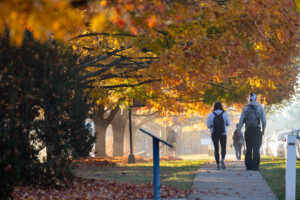
For students, a new school year means new possibilities – a fresh fall semester of classes, a launchpad for the start of their college career and a host of new resources, big and small, to ensure they’re prepared. For students starting their first days at the University of Mary Washington, whether it’s their first semester or their final one, it also means thinking about Life After Mary Washington.
Major Opportunities
With more than 100 majors, minors and areas of study, students can choose the field that fits their career aspirations, including new offerings through an Education Studies Minor, instilling skills for a wide range of classroom settings, and a Marketing Analytics Minor, focuses on tactics that make businesses boom.
Also this year, the College of Arts and Sciences has added the School of Science and the School of the Arts. Each school brings together areas of study for greater collaboration, curricular integration and interdisciplinary connections. The School of Science, housed in Jepson Science Center, will consolidate building operations, equipment maintenance and contracts, lab upkeep, chemical inventories, waste management, health and safety requirements, and purchasing, in addition to sharing innovations and initiatives for science funding and student research opportunities. The School of the Arts, which includes art, historic preservation, music and theatre, brings together areas with significant programming, community outreach and specialized instruction. These areas lead performances and have a significant impact on the arts and culture of the area.
In addition, the Departments of Computer Science, Economics and Mathematics have joined the College of Business. The Department of Athletics, Health and Physical Education and the Department of Nursing are now part of the College of Education. The Department of Cultural and Philosophical Inquiry in the College of Arts and Sciences brings together the areas of Anthropology, Art History, Classics, Philosophy and Religion in a newly named department. This five-pronged approach promotes investigation of the historical and social understanding of the past, current social relations and ethical responsibilities, and conceptions of self.
Centering University Work
The new Research and Creativity Collaborative (RCC) furthers Mary Washington’s hallmark tradition of hands-on learning solving real-world problems. Housed in Simpson Library, the Collaborative is a comprehensive collection of opportunities to work one-on-one with faculty, apply for grants, participate in symposiums and more. Buoyed by an alumni gift from Irene Piscopo Rodgers ’59, totaling more than $36 million across all scholarships and programs supported, the Collaborative aims to be the higher education leader in funding for undergraduate research at a baccalaureate-granting institution.
“We offer unparalleled funding for science, whether that’s in a medical field, biology, environmental sciences, computer science, math, chemistry or physics, giving students the opportunity to work side-by-side with faculty on real-world research, co-author papers and show their work,” said Director of Undergraduate Research Elizabeth Lewis, who leads the RCC.
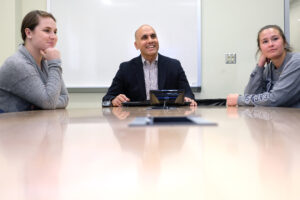
Incoming students have the opportunity to be awarded an inaugural Piscopo Rodgers Science Fellowship, a competitive funding opportunity open to in-state and out-of-state first-year students.
In addition, UMW’s new Center for AI and the Liberal Arts brings together faculty and students from varied disciplines to explore the applications and implications of artificial intelligence in a liberal arts context. The center aims to integrate AI into the University’s framework, ensuring students not only develop technical skills but also critically examine its ethical, cultural and societal dimensions.
“It’s essential to understand what AI will mean for the workforce, education and our daily lives,” said Professor of Communication and Digital Studies Anand Rao, who directs the center. “Our students won’t just learn about AI — they’ll help shape the conversation.”
Serving Up Health and Wellness
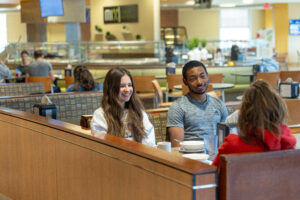
A reenergized collective of Health and Wellness has new leadership under Juliette Landphair, who previously served as vice president for Student Affairs – a position now held by Mike Walsh, who joined UMW this summer. As associate vice president for Health and Wellness, Landphair will focus on promoting physical and mental health across campus, working with the entire University community to develop a strategic and systemic approach to health and well-being, which are critical, she said, to success in class, at work and beyond. She’ll also oversee the Talley Center for Counseling Services, Student Health Center, Center for Prevention and Education, and Campus Recreation.
In addition, UMW Dining, which offers a variety of vegan, plant-based and gluten-free fare, is serving up some healthy new options this year. Simply Taco, moving into the Top of the Cedric Rucker University Center, offers allergen-free tacos, burritos and bowls. Eagle Landing welcomes a temperature-controlled Just Baked kiosk, a vending machine with the power to deliver hot food anytime with ready-to-load trays containing detailed nutritional information. And a new Solato Gelato machine offers traditional and dairy-free options in the Nest.
Small Actions Add Up
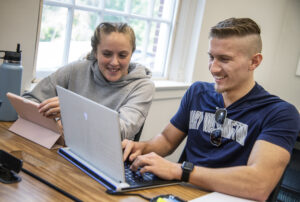
Micro-internships through Parker Dewey connect students with short-term, paid professional projects offered by employers nationwide. These experiences, ranging from market research to content creation, typically last five to 40 hours and can be completed remotely. They provide real-world exposure, build résumés, and foster professional connections without the commitment of a traditional internship.
In addition, LaunchPad, a four-week program held during the first month of the fall semester, is designed to set Eagles up for success, especially during their first year of college. Employing a casual “drop-in” style and billed as a “guided lift-off into college success,” the initiative includes tips for digging into syllabi, using Microsoft programs, organizing college life and getting connected with clubs. Weekly targeted programming provides practical strategies to support students and help them stay organized, manage their time and get involved on campus.
Groundwork for What’s Next
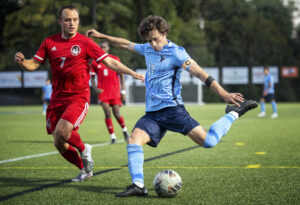
Mary Washington’s Fredericksburg Campus sports a bit of a new look this year, with work completed this summer on academic buildings, parking and infrastructure, plus new turf and fencing at the Battleground Athletic Complex. On Aug. 31, its championship soccer field will officially be named after longtime men’s soccer coach Roy Gordon, who served UMW’s intercollegiate athletics program with distinction for 34 years.
In preparation for UMW’s new theatre building at the corner of Sunken and William streets, Brent House was demolished, with the removal of Russell and Marshall halls up next, and new construction slated to start next year. With a 300-seat theatre, 150-seat studio, dressing rooms, box office, and administrative and study areas, the structure will be the new academic home of the Department of Theatre and Dance, positioned to welcome the Fredericksburg community.
“Our audience … comes to our productions to see our students learn and grow over time,” said School of the Arts Director Gregg Stull. “This approach to the building realizes that and allows them to see how we make theatre.”

